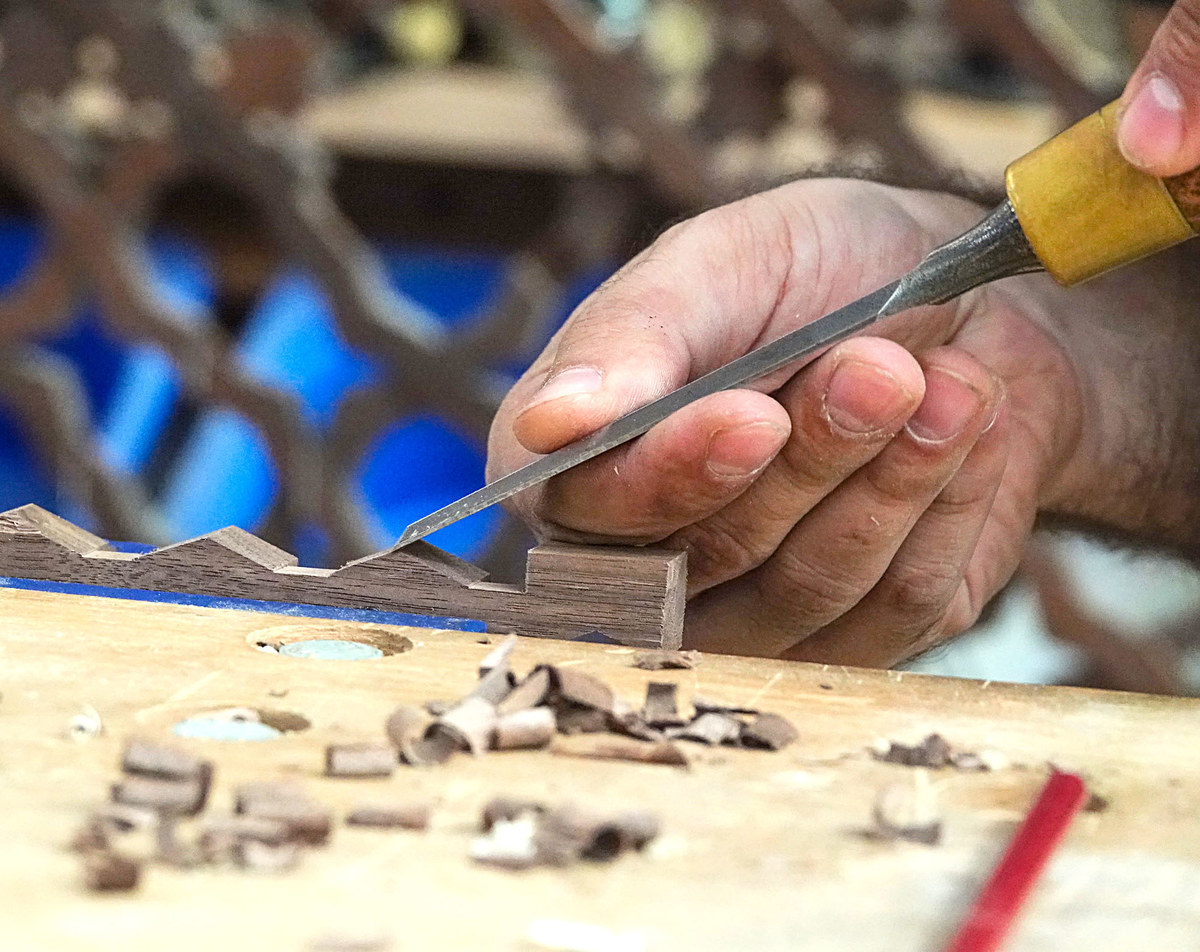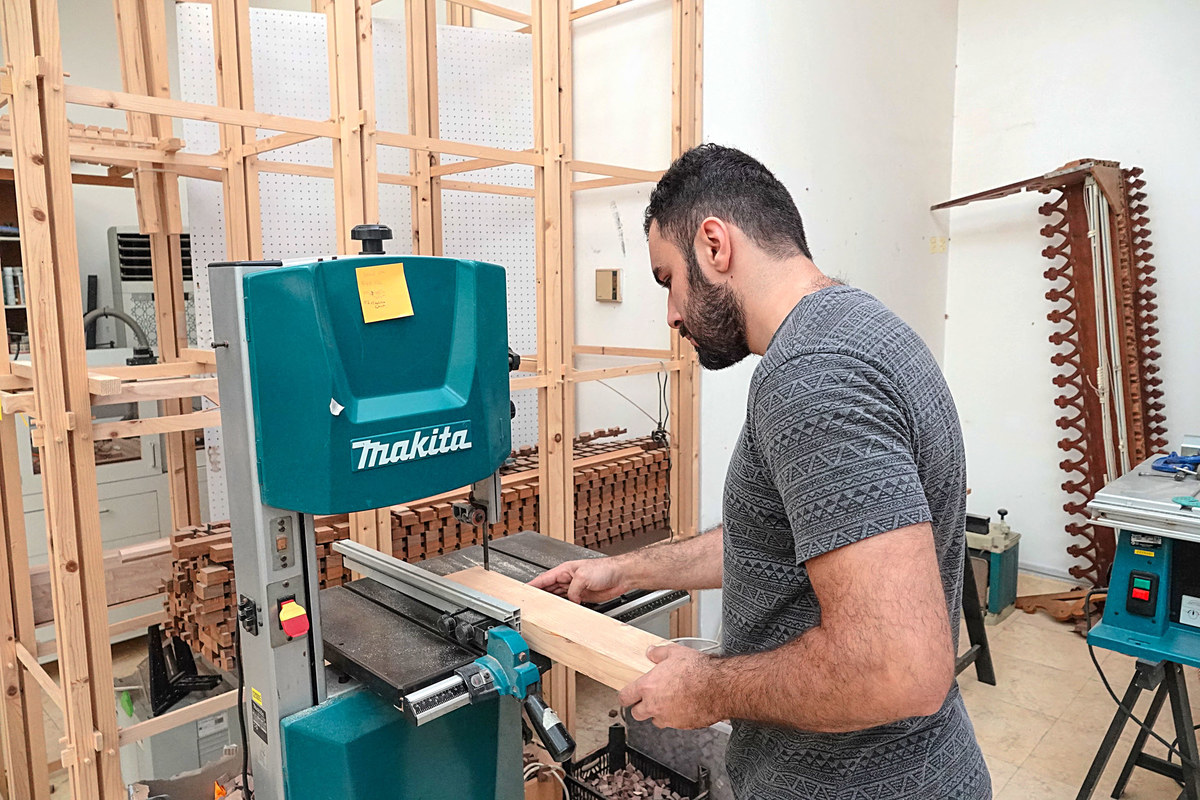JEDDAH: In downtown Jeddah there is a most peculiar and extravagant building. The Angawi House is the home of the Angawi family, a woodworking workshop and a public museum of wood crafts.
It combines urban and traditional styles, including a luxurious castle-like exterior and traditional Hijazi Rawasheen, the elaborately patterned wooden window frames found in old buildings in Makkah and Jeddah that maximize natural light and air flow.
Arab News toured the house with Ahmad Sami Angawi — the son of Sami Angawi, a pioneering Saudi architect — and one of his most skilled team members, Mohammed Alemarah.
“The woodwork that I do is mainly balancing contemporary demands and needs with the traditional technique, the Mangoor woodwork, which is an element that exists in the Roshan (the singular term for Rawasheen),” Angawi, 40, told Arab News.
Mangoor is an ancient technique, considered part of Saudi heritage, that was used to make the ornate wooden window frames. It is a unique feature of woodwork in the Hijaz region and Angawi has added his own innovations in an approach he calls “Love and the Beloved,” which he said reflects “the bond between a human and his heritage.”

The items he and his team produce, whether artistic or functional, celebrate this Roshan technique. He takes traditional Rawasheen designs and develops and uses them in the objects he creates.
“In some of my projects I have explored not only the aesthetic result, but also the end result geometrically and the way it’s made,” Angawi said.
The craft of woodworking is experiencing a revival, he said, as young Saudis take a fresh look at it and apply modern spins. One of the ways in which the Saudi Ministry of Culture is supporting this trend is through an initiative, in which Angawi is involved, to promote the work of local artisans.
“There is interest from the Ministry of Culture in promoting artists and craftsmen and it is a great pleasure to be part of that,” he said.
He also cites “Crafts of the Kingdom: Culture and Creativity in Saudi Arabia,” a book by Princess Najla bint Ahmad bin Salman, which was supervised by the ministry, as another example of the ways in which culture and creativity in the Kingdom are being showcased.
It takes readers on a journey to meet some of the most talented artisans in the country and learn about the histories, techniques and traditions behind the crafts they practice and how they continue to relate to the everyday lives of the Saudi people.
Angawi and his team designed the cover of the book and a wooden slipcase based on Sadu, the geometric shapes traditionally used in Bedouin embroidery and weaving.
“We had an amazing, skillful team working on this project,” said Angawi. “A lot of them were young Saudis, and Mohammed Alemarah was leading and managing the team and the whole process.”
Alemarah, 28, is an experienced young architect from Iraq with a knack for woodworking.
“I discovered the real meaning of art while studying Arabic calligraphy, and then I realized my ability to feel beauty,” he said. “I tried to simulate a wooden, carved, written piece where all the magic happened. The scent of pinewood stuck in my mind.
“I loved the world of the craft and the material itself, including knowledge of wood anatomy, its behavior and varieties, even the (organisms) we find around wood such as fungi, beetles and birds. I don’t think I’ll ever stop wondering about the beauty of wood.”
Alemarah is a self-taught woodworker and said he follows the “great ancestors of craftsmen and prophets.” His natural ability to learn and develop the skill has, he added, instilled a sense of responsibility toward the craft.
“I have to be very careful and specific when it comes to measurements: 1 millimeter can ruin hours of working,” he said. “Thus, a millimeter in my eyes becomes like an inch that I divide into endless parts.
BACKGROUND
• Ahmad Sami Angawi’s father, Sami Angawi, is an internationally renowned Saudi architect. He received a doctorate in Hijazi Islamic architecture from the University of London in 1988.
• His pioneering philosophy in architecture combines the creativity of traditional architecture with modern styles. He is considered a leader in the field of preserving the Hijaz style.
• He co-founded makmad.org, a German nonprofit organization based in Hannover. He has renovated many historic buildings including the house of Al-Shafei in Al-Balad, Jeddah, and Bab Al-Haram, a historic house in Makkah.
“This craft teaches you the real essence of patience and it develops your sense of observation. It also taught me that haste would lead to unpleasant results.”
The craft is based on repetition and attention to detail, Alemarah said.
“I used to consider every skill and the information that I didn’t know about woodworking an interesting and provocative mystery that must be solved,” he added.
Working with wood requires mastery of many tools, and careful attention to angles, cuts, shapes and marks. A woodworker has to be able to see things differently, Alemarah said. He added that he treats every tool as a treasure and he greatly admires the ability of his ancient predecessors who created these tools, which are still being used thousands of years later. He singled out the band saw as the most difficult to use.
“Being an architect was useful in building an eye for noticing the difference between lines, points, arcs, and shapes, as well as the architectural style of thinking and perceiving things around me,” Alemarah said. “These factors are a good basis for the woodworking industry as it cares about mastery and professionalism.”
He explained that trees grow in specific ways that are reflected in the fibers of the wood. When the trees are cut, woodworkers take into account the best possible ways to use the characteristics of the wood.
“It takes me a glance to specify the method and the tool to be used as I focus on certain elements, including the growth angle of rings, the shape of the veins, as well as the pores and their direction,” said Alemarah. “So, the woodworker’s task is to understand the appearance and direction of fibers and try to make the best out of it.”
Alemarah works mainly in woodworking, and sometimes sculpting. He also presents workshops to help spread the knowledge and science of wood and help others learn and explore the craft.
Alemarah said the chance to work with the Angawis, one of the most-renowned woodcrafting families, and Ahmad Sami Angawi in particular, was a career dream come true.
“The Angawi studio is an art space that takes beauty, mastery and development of skills and techniques into account,” he said.

The most difficult aspect of this craft, he said, is that the behavior of wood varies depending on climate, temperature and other factors.
“Wood is essentially a living organism, with pores, vessels and fibers through which water penetrates,” he explained. “The wood breathes between winter and summer, and the humidity in the air starts to shape it so it expands, shrinks, bends and cracks.
“I’m still trying to understand the philosophy of wood and I know for sure that this will take a long time.”
Ahmad Sami Angawi’s father, Sami Angawi, is an internationally renowned Saudi architect. He received a doctorate in Hijazi Islamic architecture from the University of London in 1988. His pioneering philosophy in architecture combines the creativity of traditional architecture with modern styles. He is considered a leader in the field of preserving the Hijaz style.
He co-founded makmad.org, a German nonprofit organization based in Hannover. He has renovated many historic buildings including the house of Al-Shafei in Al-Balad, Jeddah, and Bab Al-Haram, a historic house in Makkah.




























